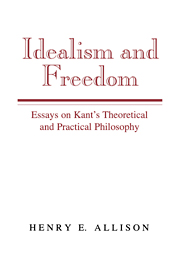Book contents
- Frontmatter
- Contents
- Acknowledgments
- Note on sources and key to abbreviations and translations
- Introduction
- Part I Kant's theoretical philosophy
- 1 Transcendental idealism: A Retrospective
- 2 Reflections on the B-Deduction
- 3 Apperception and analyticity in the B-Deduction
- 4 On naturalizing Kant's transcendental psychology
- 5 Gurwitsch's interpretation of Kant: Reflections of a former student
- 6 Causality and causal law in Kant: A critique of Michael Friedman
- 7 Kant's refutation of materialism
- Part II Kant's practical philosophy
- Notes
- Index
2 - Reflections on the B-Deduction
Published online by Cambridge University Press: 05 June 2012
- Frontmatter
- Contents
- Acknowledgments
- Note on sources and key to abbreviations and translations
- Introduction
- Part I Kant's theoretical philosophy
- 1 Transcendental idealism: A Retrospective
- 2 Reflections on the B-Deduction
- 3 Apperception and analyticity in the B-Deduction
- 4 On naturalizing Kant's transcendental psychology
- 5 Gurwitsch's interpretation of Kant: Reflections of a former student
- 6 Causality and causal law in Kant: A critique of Michael Friedman
- 7 Kant's refutation of materialism
- Part II Kant's practical philosophy
- Notes
- Index
Summary
The Transcendental Deduction in the Critique of Pure Reason is clearly among the most highly praised, often criticized and least understood items in the philosophical canon. The obscurity and complexity of the text have enabled philosophers of vastly different persuasions to find what they wish to find in it and to disregard the rest. Thus, for Kant's idealistic successors it was the main inspiration for a speculative metaphysic of the I that contained both the deepest truth of the “critical” philosophy and the key to the transcendence of its allegedly “dogmatic” elements, such as the conception of the Ding an sich. By contrast, in our day it has been thought to contain the germ of a powerful transcendental argument that, starting from some supposedly noncontroversial premise about self-consciousness or the self-ascription of experience, arrives at substantive, anti-skeptical conclusions regarding the objectivity of experience, without any of the excess baggage of transcendental idealism or transcendental psychology.
Curiously enough, these radically different approaches to the text have more in common than one might at first assume. Specifically, they share the view that the crucial theme in the Deduction is the correlation between selfconsciousness or the capacity to say ‘I’ (apperception) and the consciousness or experience of an objective, spatio-temporal world. Indeed, the root idea that these somehow mutually condition one another is the nerve center of the Transcendental Deduction in virtually every interpretation from the most metaphysical to the most analytic.
- Type
- Chapter
- Information
- Idealism and FreedomEssays on Kant's Theoretical and Practical Philosophy, pp. 27 - 40Publisher: Cambridge University PressPrint publication year: 1996
- 2
- Cited by



